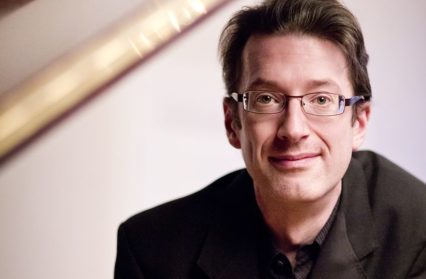Cath Barton visits the Royal Welsh College of Music and Drama to witness a recital by Llŷr Williams, the second concert in his Pictures in Music Series.

Llŷr Williams is such a wonderful communicator that it is always worth going to his recitals, even if the composers whose music he is playing are not your favourites. What he does is to illuminate the music, so that what you might have thought dull you consider under a new and brighter light.
In a series that he is giving over the 2019/20 season at the Royal Welsh College of Music and Drama in Cardiff, he has curated programmes of music that have, as he puts it, ‘descriptive or pictorial titles’.
The piano music of Liszt may frighten a lesser pianist, but Williams can match the composer in his extreme virtuosity, and in five of his Etudes he evoked middle-European vistas of sweeping forested landscapes, for me the countryside in the paintings of the German Romantic artist Caspar David Friedrich. The technical demands of this music – including hand-crossing of great intricacy and pedalling complexity – seem never to faze Williams. From his student days at the Royal Academy, he has impressed with his skill, but earlier in his career, he was seen by some as rather too solemn and self-contained in performance. In 2015 the music journalist Ivan Hewett described him, in a review of a Wigmore Hall Beethoven recital, as needing to “loosen up a little”. That criticism could certainly not be levelled at him in relation to this concert. Profoundly serious, yes, and always in the service of the music, but with touches of humour and play with the audience, drawing us into the flow of the music and then making us wait for moments of resolution and emotional release.
Britten’s Holiday Diary was shown up, in the company of the Liszt Etudes, as an altogether slighter work. When I heard this in a Gregynog Festival concert that Williams gave in 2013 in celebration of Britten’s 100th birthday, the context was perhaps kinder to the young composer’s aspirations. There the virtuosity of the movement Fun-fair conjured up for me hammers coming down and ringing up prizes; now I heard it as no more than Britten showing off. In his introductory remarks, Williams shared his own reservations about the concluding piece in the cycle, Night, saying that a more mature composer would not have equated the feeling of stillness he wanted to evoke with extremely slow music. I felt the inclusion of the Britten to be a nod to the fact that it was written on a holiday in Wales.
Williams opened his programme with Robert Schumann’s cycle Papillons, a dozen miniatures evoking the drama and swirl of the masked ball – inspired, Schumann apparently said, by a scene in the German Romantic writer Jean Paul’s unfinished novel ‘Flegeljahre’. It felt to me like an early nineteenth-century version of Strictly Come Dancing, with different dances tripping on the heels of one another, full of colour and hints of intrigue.
Where the Schumann work was exuberant, the early twentieth-century music with which Williams followed it was dark. The ten miniatures which he gave us from Janáček’s On an Overgrown Path fell into two halves. The first five are wistful, recalling the composer’s happier days in the Moravian countryside when he was young. His use of repeated melodic cells and motifs both make the music immediately appealing to the listener and facilitate the build-up of emotional intensity, all the more so in the hands of Williams, who has an extraordinary ability to enter and convey the essence of a composer’s musical intentions. The way he plays and draws the music from the piano is a joy to watch.
The second set of Janáček’s pieces from this cycle were written in the shadow of the death of his daughter just before her twenty-first birthday. Williams conveyed the anguish in the music most poignantly. In the last but one piece, In Tears, there was for me something of the melancholic feeling which, nearly half a century on, Poulenc would evoke for the loss of his beloved free France in his song for voice and piano, C. Different composer, different time, different country, but a connection through love, loss and the power of musical expression. For others, there may be different such connections, equally powerful.
In the final piece of the cycle the barn owl, an omen of death in Czech folklore, seemed to loom over the stage and, in the final notes, I felt the scratch of his claws.
Impressive as the Liszt was, it was the Janáček which was, for me, the glory of this recital by a pianist who I think stays in the memory of all who hear him. He left us with, as a tantalising encore, a two-minute taster for the next in his Pictures in Music series, a tiny minute by Ravel on a theme from Haydn and playing on the A and D from his name.
Llŷr Williams Pictures in Music 3 is at the RWCMD on Thursday, 30th January 2020, focussing on music from France and Spain.
Pictures in Music 4 is on Thursday, 30th April 2020, with music from Russia.
Cath Barton won the New Welsh Writing AmeriCymru Prize for the Novella with The Plankton Collector, which is published by New Welsh Review under their Rarebyte imprint. Her second novella, In the Sweep of the Bay, will be published by Louise Walters Books in September 2020, and in early 2021 Retreat, West Books will publish her collection of short stories inspired by the work of the Flemish artist Hieronymus Bosch.
Header Photo Credit: BG Ealovega



 Enjoyed this article? Support our writers directly by buying them a coffee and clicking this link.
Enjoyed this article? Support our writers directly by buying them a coffee and clicking this link.







